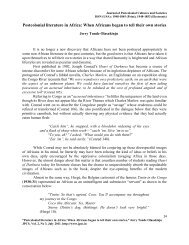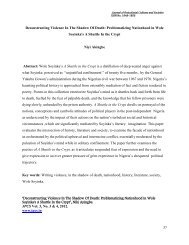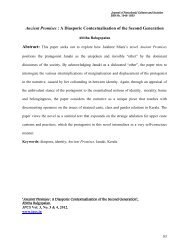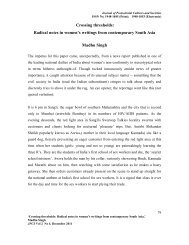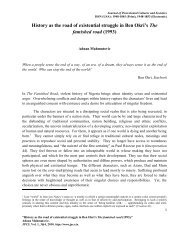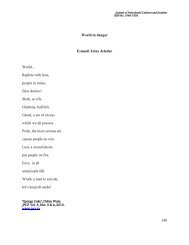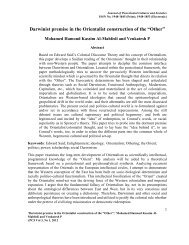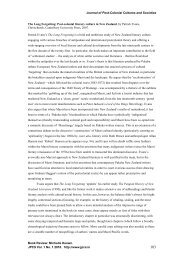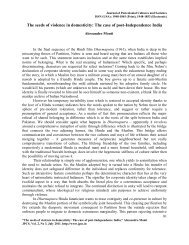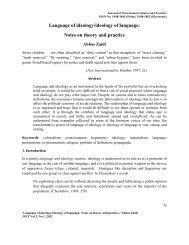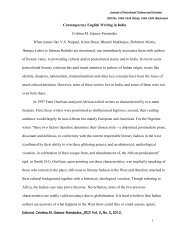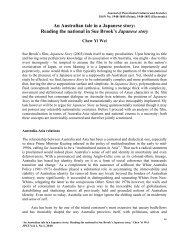A psychoanalytic expedition into the dark core of the ... - JPCS
A psychoanalytic expedition into the dark core of the ... - JPCS
A psychoanalytic expedition into the dark core of the ... - JPCS
You also want an ePaper? Increase the reach of your titles
YUMPU automatically turns print PDFs into web optimized ePapers that Google loves.
Journal <strong>of</strong> Postcolonial Cultures and Societies<br />
ISSN No. 1948-1845 (Print); 1948-1853 (Electronic)<br />
draw him to its pitiless breast by <strong>the</strong> awakening <strong>of</strong> forgotten and brutal instincts, by <strong>the</strong> memory <strong>of</strong><br />
gratified and monstrous passions” would more closely approximate <strong>the</strong> state <strong>of</strong> <strong>the</strong> Freudian 'id' than<br />
<strong>the</strong> 'super-ego'. Completely in <strong>the</strong> realm <strong>of</strong> an elusive tribal reality, Marlow finds himself disgusted by<br />
his own ideal who is suffering from delusions <strong>of</strong> a kind <strong>of</strong> imperial self-grandeur. This is <strong>the</strong> point<br />
when <strong>the</strong> ego is confronted with <strong>the</strong> absurdity and ultimately repulsive truth <strong>of</strong> its own ideal. This is <strong>the</strong><br />
point <strong>of</strong> trauma – <strong>the</strong> neurosis <strong>of</strong> <strong>the</strong> self-image.<br />
Of course <strong>the</strong> Freudian idea <strong>of</strong> 'repression' abounds in this analogy. Apparently <strong>the</strong> very tribal cultures<br />
that Kurtz had earlier written about suppressing had eventually overturned his own mental state, and<br />
ultimately re-emerged to completely take hold <strong>of</strong> Kurtz's own being. The fact that this experience was<br />
traumatic for Marlow himself becomes evident in him suppressing its contents for a year after Kurtz's<br />
death. And even when he does encounter Kurtz's widow, he does not dare to utter <strong>the</strong> truth, ra<strong>the</strong>r<br />
preferring to repress its disturbing and ra<strong>the</strong>r horrific contents. No doubt, <strong>the</strong> repressed contents would<br />
come out later, such as <strong>the</strong> unprovoked monologue that is poured out to <strong>the</strong> audience on <strong>the</strong> Thames<br />
River. If this narrative is analyzed as <strong>the</strong> ego in pursuit <strong>of</strong> its ego-ideal, and eventually coming to<br />
encounter it as an oppositional devolved presence is read in terms <strong>of</strong> <strong>the</strong> European colonial experience,<br />
<strong>the</strong>n <strong>the</strong> enlightened European colonial consciousness could only be read as a neurotic self-invested<br />
endeavor <strong>into</strong> <strong>the</strong> very <strong>dark</strong> depths <strong>of</strong> insanity.<br />
Biography<br />
Asif Ali Akhtar hails from Lahore, Pakistan and is currently based in New York City where he is<br />
studying Political Theory at <strong>the</strong> New School for Social Research. Apart from writing fiction, he also<br />
contributes to various news publications and blogs.<br />
References<br />
A <strong>psychoanalytic</strong> <strong>expedition</strong> <strong>into</strong> <strong>the</strong> <strong>dark</strong> <strong>core</strong> <strong>of</strong> <strong>the</strong> enlightened mind,’ Asif Ali Akhtar<br />
<strong>JPCS</strong> Vol 3, No 1, 2012<br />
45



